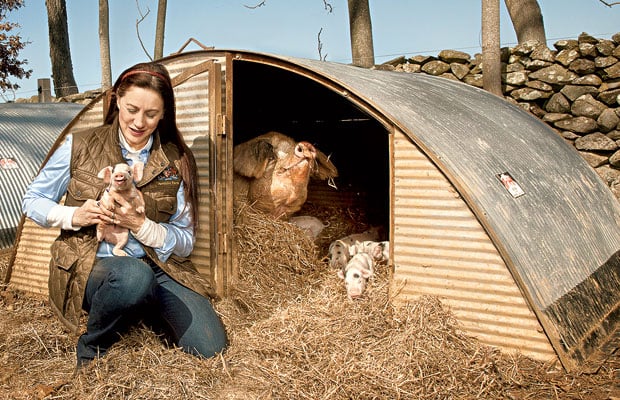Sandy Lerner sits in a field in her black Range Rover, the door
emblazoned with the crest of Ayrshire, her 800-acre farm in Upperville,
Virginia. Out of the tall grass teeters a days-old calf with a white face
and black ears, one of more than 200 born to her 1,200-strong herd last
spring. Against the backdrop of the Blue Ridge Mountains, the calf
stretches its gangly legs and takes a few experimental hops.
“Look!” says Lerner, who usually seems aloof. She watches with
delight, as if it were her own child walking for the first time. “I love
watching them–it’s like cow TV. Even if you know they won’t be here for
long.”
Which means here today, hamburger tomorrow. Or maybe not.
Lerner–who made millions founding (and then leaving) Cisco Systems, an
early technology start-up, and Urban Decay, a cosmetics company–hasn’t, in
the 15 years she’s been raising beef by USDA organic standards, made money
doing it. Now she’s torn: keep raising these gorgeous animals to supply
her nearby Hunter’s Head Tavern and Home Farm Store, use them for her
high-end Furry Foodie pet food, or sell the lot and get out
altogether?
“I put my beef up to any. Am I going to keep subsidizing it
forever? Absolutely not,” says Lerner, 56, her eyes steely behind round
glasses and her hair–which, when hanging down, reaches the small of her
back like Morticia Addams’s–gathered into a messy bun. The woman the press
has variously tagged “wispy” and a head-turner now favors jeans, sky-high
wedge sneakers, and baggy T-shirts paired with necklaces she beads
herself.
“In the next few months, all that beautiful heritage-breed
food–your dog might be eating it,” she says. “Is that what the American
consumer wants? I would be happy to end up the nation’s primary supplier
of the best pet food on the planet.”
Lerner’s life has always centered on animals. The farm has more
than 70 cats, which she deems as essential to Ayrshire’s ecosystem as its
turkeys, chickens, pigs, cattle, horses, and dogs. She treats all
creatures well–her operation is certified organic by Oregon Tilth, a USDA
certifying body, and certified humane by the Humane Farm Animal Care
program, adhering to a strict code dictating how animals are treated not
only in life but in the way they’re put to death.
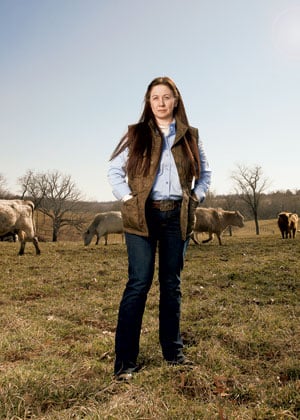
“I basically grew up alone in a barn,” says Lerner. “I was the
only child on the farm, and my aunt and uncle had full-time jobs like most
farmers did.” She was just four years old when her parents divorced, and
she eventually went to live with her aunt and uncle on a cattle ranch in
the foothills of Clipper Gap outside Sacramento. She spent many summers
with another aunt in Beverly Hills.
She credits her aunt and uncle–and nine years in 4-H–for who
she is today. Uncle Earl Bailey, and Aunt Doris, who is now 93, ran a
home-heating-oil business–leaving Lerner, a self-described shy, awkward
child, to care for the cattle. At age nine, she started raising her own
steer.
“There was no division of boy and girl work,” Lerner says. “My
aunt was one of the most tenacious women on the planet–she was strong and
vocal, and she just would not give up.”
Born on Bastille Day 1955, Lerner, a child of the ’60s, has
always been a rebel. Her past is punctuated with controversy, perhaps the
most defining one her unplanned exit from Cisco Systems–the company’s
equipment today runs an estimated 80 percent of the Internet–which she and
then-husband Len Bosack formed in 1984, leaving six years later with $170
million between them.
In 1996, after seeing 50 properties, she paid $7 million for
Ayrshire, in a wealthy area where neighbors have last names like Mars,
Fleischmann, and Mellon. Her arrival seemed to be good news in a community
that cares about land preservation–the owners long waited for a buyer who
wouldn’t subdivide the farm. But on arrival she closed the land to the
Piedmont Fox Hounds, members of which had been running in the area since
1840. She then bought a historic home central to the nearby village of
Upperville, intending to establish a pub. When some opposed her, she
erected a chainlink fence around it and posted a demolition
sign.
“She’s not thin-skinned,” says Harry Atherton, then chair of
the Fauquier County Planning Commission. “Most people live here because
they want to, and they don’t like change. Anyone else would have walked
away.”
The battle got ugly, with Lerner receiving what she calls
“death threats” from a neighbor. But deep pockets can fund lawyers, and
Lerner had them. (Many locals still decline to discuss her on the
record.)
The battle raged for a year and a half before the zoning board
found in her favor on the pub. Now many of her former opponents’ names can
be seen engraved on the pewter mugs that hang above the bar for regulars.
Perhaps coincidentally, when she finally got her way she named her
English-style pub the Hunter’s Head. Over one fireplace hangs the visage
of a terrified-looking man wearing a riding helmet.
That kind of cheek is trademark Lerner. Forbes
magazine sent a photographer to Ayrshire, and she posed naked on a Shire
horse. In her Urban Decay days, she wore blue body paint to a party for
the British prime minister. She had a “trailer trash” party to launch the
luxury motor home in which she took her cat to Williamsburg and Niagara
Falls in the last weeks of its life. At the party, there were lots of
leotards, exposed hairy stomachs, and moonshine.
If she seems to step over the line, maybe she’s unsure where
the line is.
“Body language means nothing to me, but I can tell you what a
cow is thinking from 50 paces,” she says. Though Ayrshire has a large main
house, which she spent $2 million to restore, she lives in a cabin on the
farm. “I live alone with my cats. I’m your typical nerd who lacks social
skills.”
She says that because her only model for childhood is her own,
she’s never had kids. She doesn’t talk about her marriage or relationships
except to say she was married and does date. Would she remarry? “Never say
never,” she says. “Never is a long time.”
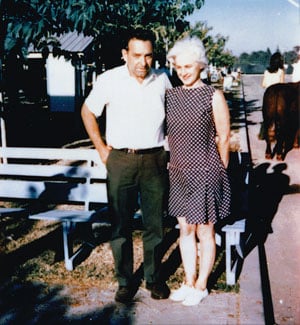
When she does care, it’s on a generous scale. She’s spent
thousands of dollars on pioneering medicine for her cats, dogs, and
horses. She built a new sound system for a local church and regularly
opens her farm to charity events, many of which benefit animals. She has a
collection of carriages and a team of Shire horses, which she lends out
for local Christmas parades and for friends heading to the chapel to get
married.
Driving through Ayrshire Farm, Lerner scribbles notes on a pad
stashed between a diet Snapple and a York Peppermint Patty. As she tours
the meat locker, she takes one look at the hanging carcasses and turns on
her heel. “Excuse me,” she says, her voice flat, “I’ve got to go pitch a
fit.” It turns out the animals were hanging with their kidneys intact;
kidneys, she has repeatedly told her staff, need to be taken
fresh.
“Last year we had profitable turkeys, the chickens are driving
over to the right side of zero, and I think I will get my pigs over, if
not very close. The only thing I have not been able to drive in the right
direction is the beef operation,” she says, tapping a nail painted with
black polish.
Lerner started at Ayrshire as she had as a kid, with heritage
cattle, but “it didn’t take a genius to figure out you need an integrated
farm to produce the waste you put back on the field.”
So she added chickens, turkeys, and pigs, even a garden–now
defunct, as it couldn’t turn a profit–making the farm a sustainable system
in which the animals and their waste power the soil, which in turn
nourishes the animals without chemical pesticides, medicines, or feed. In
separate operations, she buys lamb and raises veal, all of which she
serves and sells at the Hunter’s Head Tavern and the Home Farm Store. She
also supplies high-end restaurants such as Restaurant Nora and the Inn at
Little Washington, and organic markets such as MOM’s in Maryland, but
rising fuel costs cut that profit to the bone.
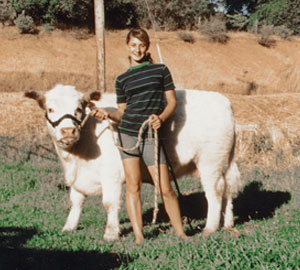
Lerner praises the British (she has a home near Bath), who
established an organic economy after mad-cow disease decimated their food
chain in the ’90s.
“The Brits have saved their countryside, put back rural
industry, and rebuilt the food chain,” says Lerner of programs that assist
not only farmers but entrepreneurs setting up supporting businesses such
as canning and processing. According to the US Department of Agriculture,
about 80 percent of food costs accrue after the product leaves the farm–in
transporting, processing, and distributing. Farmers get 20 percent.
“There’s no food infrastructure here,” she says. “Farmers have to be
carpenters, engineers, marketers–that’s why so many give up.”
Lerner’s beef is with some of the USDA regulations governing
the term “organic.” For most livestock, to be labeled as such, the
animal–or its mother before it’s born–must be fed organically and provided
pasture with no drugs or hormones during the last third of its gestation.
Meat from Lerner’s Home Farm Store has an ID number on the receipt,
tracing it back through processing–she bought her own processing facility
in Front Royal in 2008–to the animal itself. And all these operations must
be documented for USDA certifiers, who check in regularly. If the animal
gets sick, it must be treated, and if that requires a non-approved
substance–Terramycin, for example, which treats pink eye, a common cow
condition–the animal is no longer considered organic.
In other words, the investment is lost.
“Your capital is tied up too long before you see a return,”
says Lerner. Even with consumers willing to pay a premium for organic
beef, the costs are often not offset by profit. “What is the risk over
four years of something happening to that animal that will remove its
organic certification? It is a barrier to entry that I believe was
constructed by the packer-cartel beef lobby.”
Lerner fumes when she talks about this “cartel,” the four
meatpacking companies that dominate the market–Cargill, National Beef,
JBS, and Tyson.
Ayrshire is in a tough market space. A medium-size farm but not
a family farm, it has all the expenses of professional staff–vacations,
insurance–without the economies of scale of large producers. Or the
subsidies: Of $261.9 billion in farm subsidies paid in the US between 1995
and 2010, most has gone to the largest farmers, according to the
Environmental Working Group. Some 62 percent of American farmers get no
subsidies.
“To be certified organic more than doubles the cost of raising
the cattle,” says Mike Brannon of Old Line Custom Meat Company, a
medium-size beef producer in Maryland that raises beef mostly on pasture
without hormones. Even with the premium that organic beef commands at the
cash register, he says, “I just don’t see the numbers
working.”
Which is why many farmers are instead using labels such as
“local,” “natural,” and “pasture-raised” to market their
products.
“Buying local has been a byproduct of trying to find the
best-tasting ingredients to put into cooks’ hands,” says Ryan Ford, owner
of the Organic Butcher in Charlottesville. Despite the name, many of his
suppliers are not certified organic. “All our products are natural,
non-genetically modified,” he says. “Our customers want a local product
that is sustainably raised, but they don’t really require us to carry
organic.”
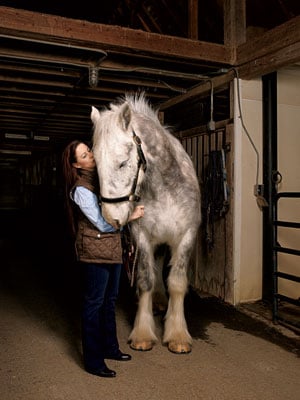
“I like to use the term ‘beyond organic,’ ” says Derek
Luhowiak, who worked at Ayrshire and now with his wife, Amanda, owns the
Whole Ox butcher shop in the IGA supermarket in Marshall, Virginia. “A lot
of people can’t afford the certification, but what they do have is
transparency. They’re using organic feed, the chickens are running
around–but it’s a huge trust issue. We have to trust the farmers, and you
have to trust me.”
Which is fine if you know the farmer or the butcher, but
marketing terms such as “pasture-raised” and “local” aren’t backed by any
regulations. Beef may be “pasture-raised” on grass treated with
pesticides. Or be “local” and fed conventional grain, which almost
certainly has some genetically modified ingredients.
“The organic label is the gold standard,” says Gwendolyn Wyard,
associate director of organic standards and industry outreach for the
Organic Trade Association, who works with farmers and the USDA in trying
to ensure that organic standards are rigorous and transparent but
achievable. “You can’t just slap the word ‘organic’ on something, not
anymore.”
Lerner is passionate about the benefits of organic beef, both
to human health and the environment: She was a vegetarian for 30 years,
until she raised her own organic, humanely raised and processed animals.
But this is one passion she may not be able to sustain.
“If I dispense with organic, my cost of feed would go down
four-fifths,” says Lerner. But organic is the only feed she can be sure is
without genetically modified ingredients and grown without pesticides,
both of which she believes lead to harmful side effects.
“Cargill and Tyson are not worried about the family farm,” says
Lerner. “They’re worried about mine, and Niman [Ranch], medium-size farms
that could take regional markets because people are trying to buy local.
They are very smart, very well funded, and they hold the processing
facilities hostage. And I think they’ve won.”
Now in addition to spending time trying to meet the organic
market, Lerner is spending time separating her operations in a way that
would make them easy to divest.
“As the organic market matures, mid-sized organic farms are
being acquired by the food conglomerates to give them instant healthy
cred,” Lerner writes in an e-mail. One day she’s hot for the challenge,
the next tired of it.
She has separated the parcel on which her cabin stands from the
farm, should she decide to sell the farm. Her cats and her dog are the
only things she’s adamant she’ll keep.
Sandy Lerner has always been riled by the powers that be. She
remembers lying on the floor at age 11, waiting to be incinerated by a
nuclear bomb. She graduated from high school at 15 and studied political
science at California State University, Chico, and then at Claremont
Graduate School, where she first used a computer.
“My first thesis was on American antitrust legislation–back
then there was nothing off the shelf; you had to program it from the word
go,” she says over lunch at her pub, where she orders a meatball sub and a
Coke Zero and asks what’s for dessert–she says she has a sweet tooth. She
eats here often and engages in small talk with patrons, who ask her about
her trees or a planned racquetball court.
In 1976, Lerner shifted focus to computing and applied to
Stanford, where she not only was accepted but was paid $25 an hour to
program–a fortune to her at the time: “And I could work whenever I wanted,
in jeans and no shoes.”
In those days, the collective brainpower at Stanford probably
made it glow from outer space. Collaboration with Xerox’s Palo Alto
Research Center, home of the first Ethernet, attracted Department of
Defense funding of technologies now collectively known as the Internet.
Lerner, along with Len Bosack, a whip-smart computer scientist she
eventually married, worked on a multiple-protocol router, key to
inter-network connectivity. When Stanford dithered over making the
technology available to research partners at other universities and
corporations, they left, founding Cisco (short for San Francisco) Systems
in December 1984.
“Len and I thought that was against the spirit of collaborative
research and the use of public funds for the Internet and fundamentally
unreasonable,” says Lerner. She seems too shy to make eye contact when
talking, looking instead at your neck and checking in every so often just
to see if you’re following her.
By 1987 she and Bosack were selling $250,000 worth of routers
each month. The company grew to $27 million by 1989 with funding from
Sequoia Capital’s Don Valentine, who appointed a new CEO. In 1990, the
company went public and Lerner was ousted; Bosack followed.
“I thought they were partners–we had no employment contract,
our stock was only half vested–and we used their lawyer. Can you spell
dumb?” says Lerner. “It was time for us to go–the company was mired in
bureaucracy–but the way it was done was unprofessional and unfair,
inhumane. Cisco broke up my marriage, ruined my health.”
She’s still bitter, but she’s not letting that spoil her lunch.
She declares the meatball sub, which she worked hard developing, a
triumph.
“Forgiveness was not in her vocabulary,” Valentine told a group
of students at Stanford Graduate School of Business in the fall of 2010.
“When somebody . . . didn’t do it the way she wanted it, she shredded them
publicly.”
Lerner admits she has trouble accepting other people’s answers.
“If a man is blunt and strong and holds his ground, he’s manly,” she says.
“I don’t think Patton or Steve Jobs or anybody else who made themselves
and their fortune–Edison was apparently a big SOB–does anyone say they
weren’t nice?
“I think a large part of it is I don’t have a great
personality. I am fairly blunt and very shy–but who cares? Everything I’ve
done, it needed to be done.”
At 35, she had money to do it. Though they now live on
different coasts, she and Bosack established a foundation with most of
their proceeds: He likes weird science–the search for
extraterrestrial-intelligence (SETI) –and she animals; the Luke and Lily
Lerner Spay/Neuter Clinic at Tufts is named after two of her
cats.
“Len and I have been very involved and careful,” says Lerner of
the foundation, recalling a story about a man who wrapped his Ferrari
around a telephone pole and died the day his company went public. “Money
has been a very enabling thing. On the other hand, I pay absolutely no
attention to it. I’m not talented or beautiful–I don’t think a lot of
people pay attention to me other than I have this money.
“It’s not that it defines me, but it enables me to do the
things that I do–be an organic farmer, publish my book.”
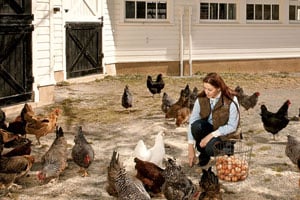
Lerner’s book, Second Impressions, is a sequel to Jane
Austen’s Pride and Prejudice, which was initially titled
First Impressions. Lerner fell for Austen in 1982, when she saw
the BBC series Pride and Prejudice, starring Elizabeth Garvie
(now a friend) as Lizzie. For Lerner–who had already caught Anglophilia
while captivated, along with the rest of the world, by the romance of
Princess Diana–it went right into a vein. The civility, the confidence,
the humor, the pristine countryside all stood in glorious contrast to the
nerdy computer world in California, where the orchards she grew up in were
being bulldozed for strip malls. Lerner has read every word of Austen an
“unjustifiable” number of times and was at an Austen convention in 1992
when she found that Chawton House–once owned by Austen’s brother and on
the grounds of which the novelist wrote six books–was in
receivership.
Lerner called her secretary and eventually purchased a 125-year
lease from the Knight family–1.1 million pounds for the house and another
250,000 for the stables.
“It was a hell of a deal: 300 acres, an Elizabethan house, and
400 years of dereliction,” says Lerner, who bought it sight unseen. “I
either wanted it or I didn’t. I never test-drive cars,
either.”
The town was in a tizzy: Would this American firecracker build
an Austen theme park in their beloved Hampshire countryside? Her vision: a
study center to house her collection of books by and about English women
from 1600 to 1830–now more than 10,000 works, with the most rare digitized
for online reading. Lerner began collecting them in 1996, believing that
early women writers didn’t get enough credit for their role in the genesis
of the novel.
But the townspeople didn’t want the traffic, the parking, or
her fancy landscaping restoration. It was a standoff. Full approval for
the $10-million project took seven years.
She didn’t sit on her hands and wait. While Chawton simmered,
she turned her attention to makeup, founding Urban Decay in 1995, a
cosmetics company typified by edgy lip and nail colors including
“asphyxia,” “roach,” and “bruise.”
“As we all do, my youthful face was getting less youthful,”
says Lerner, whose aunt recommended she use makeup. “I adored her, so
okay, but all the makeup wanted me to look like Christie Brinkley. I
thought if I have to fight with my face the next 60 years, this better be
fun.”
The line, with typical Lerner irreverence, also featured body
paint and temporary tattoos. (She had one of those designs, a leafy
question mark, permanently inked on her arm for her 47th birthday.) The
company has a strict no-animals testing policy. Dark colors became
industry standard, and Urban Decay sold to LVMH in 2000 for a reported $20
million. (Former friend and horse trainer Pat Holmes took Lerner to court,
claiming a founding role, eventually winning $1.4 million.)
When Chawton was finally approved, she closed off the estate to
hunting, keeping draft horses and chickens and establishing an organic
garden; the produce is sold locally and used for private parties at the
estate. Now the house, the grounds, and the library are open to the
public.
“It’s trench mentality–just keep your head down and keep
going,” says Lerner of her efforts. “The pub was the same, the farm was
the same.” But she pleads tired of the climb.
“My goal is to do nothing,” she says, paraphrasing a line about
her hero, former British prime minister Benjamin Disraeli: “To become what
he is from what he was is perhaps his greatest achievement.”
Yet in the next breath she’s talking about her projects–she
hasn’t watched television regularly since The Addams Family was
canceled in 1966, except for the occasional Masterpiece Theatre and, of
course, Princess Diana’s wedding, choosing instead to read. She’s
integrating the operations of the farm, pub, and store to be run on iPads.
She’s designing the children’s menus, complete with word puzzles and
coloring, as well as bumper stickers. And there’s Sono Luminus, a record
label she and Bosack founded in 1995 that’s headquartered in nearby
Berryville; its recording of Eliesha Nelson playing viola works by Quincy
Porter tied for Best Engineered Classical Album at the 2010 Grammy
Awards.
Much of the past year was spent writing her book, which she has
been thinking about since 1984. Published as the first title from Chawton
House Press, Second Impressions–under Lerner’s nom de plume, Ava
Farmer–came out last November. She says she knew so much about Jane
Austen’s world by the time she wrote the book that she literally channeled
her. (Though she’s nuts about the English novelist’s work, she isn’t so
sure they’d be friends, as Lerner is Jewish and Austen was a product of
her time.) Now she’s considering writing a sequel set in
Virginia.
Some days, she can see herself living in England in the
future.
“They have a very enlightened view of animals,” she says.
“Here, there’s this constant stress that goes on for anyone into
conservation. They haven’t wrecked their countryside in 10,000 years–we
wrecked ours in 200. One small turn of politics and this could be a strip
mall.”
This article appears in the May 2012 issue of The Washingtonian.

